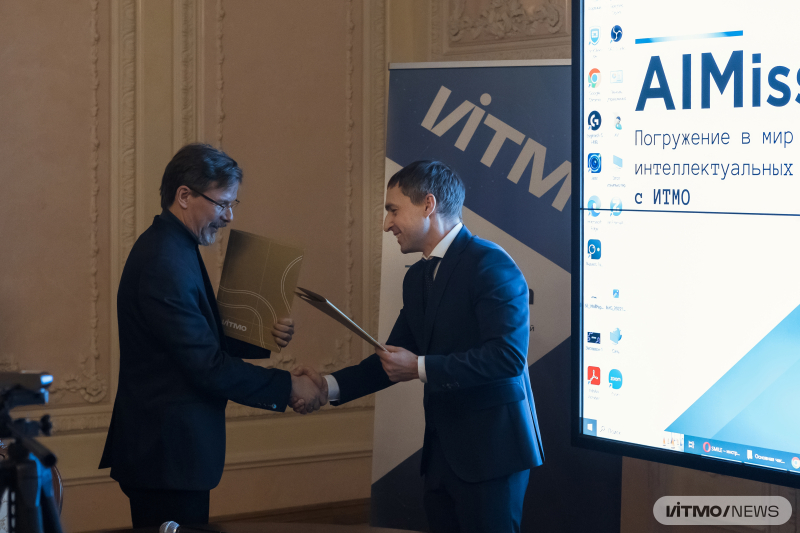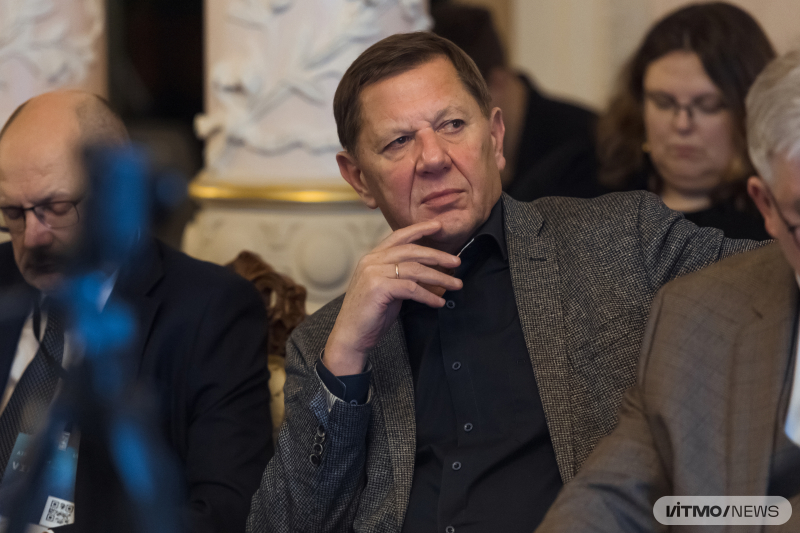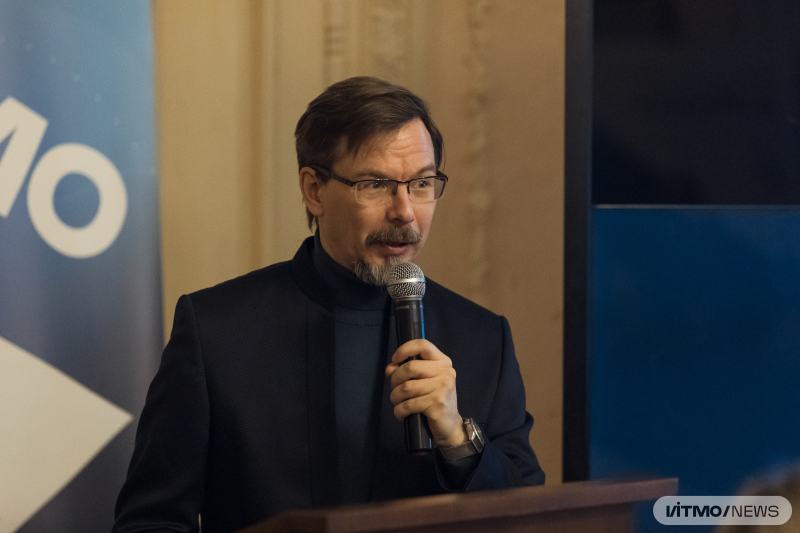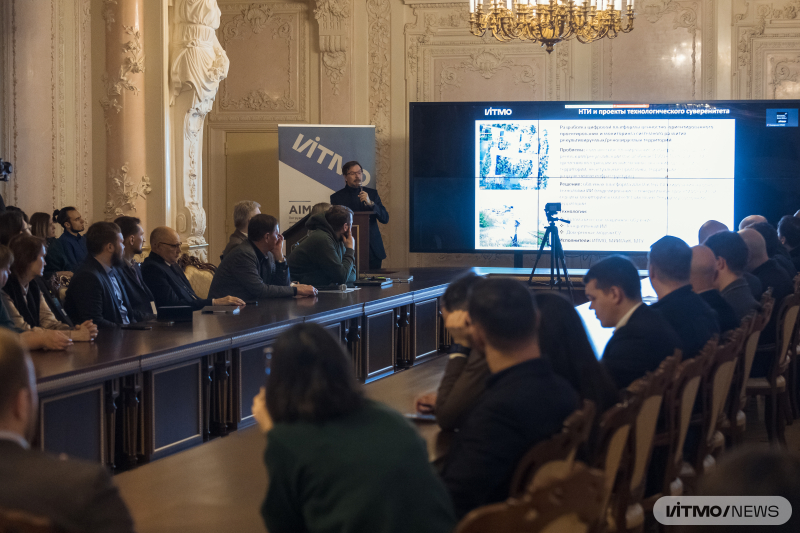ITMO and Rosneft Collaborate on New Corporate Lab to Innovate IT Solutions for Geological Exploration
ITMO and the oil and gas giant Rosneft have announced the launch of a new joint laboratory of modern digital solutions in industry. There, students and staff of both partners will address industrial tasks with AI models that can help explore deposits and predict oil extraction and ice flow. The lab will also train specialists capable of delivering new digital industrial solutions.

Bridging several fields of activity, the new laboratory will become a hub of innovation: apart from developing ongoing joint projects, scientists will design new digital technologies based on mathematical modeling and AI, perform diagnostics on industrial equipment, and advance industrial robotics.
“AI tools are already becoming ubiquitous, but this poses several challenges. First, we have to train professionals who truly know what AI is and have a detailed understanding of it. Second, there is the issue of the lack of infrastructure for high-capacity computations. As major IT companies and universities cannot tackle these challenges alone, it is important to unite our resources,” said ITMO Rector Vladimir Vasilyev.
At the launch of the lab, ITMO representatives also showcased several projects already developed jointly with Rosneft. The partners are currently working on the RN-Seism software suite, which assists users with geological exploration, in particular with such tasks as the positioning of drill holes and monitoring of the extraction process. Within another joint project, the partners are developing machine learning algorithms to predict oil yields and control flooding.
Additionally, ITMO and Rosneft are advancing machine learning models that predict the movement of ice in the Arctic for a period of up to three years, which is crucial for marine navigation. Moreover, the digital twin technology, as well as the services SMILE.Cloud and FEDOT (open-source automatic machine learning framework) developed by the partners are being used to model industrial processes and train up-and-coming specialists.
In 2023, ITMO and RN-Technologies launched a new exploratory project aimed at developing research-intensive digital solutions. In particular, it is meant to use the company’s software to develop an IT product for the oil and gas sector that will be able to solve research objectives and train industry specialists and students using modern approaches. The main goal of this pilot project for 2023 was the integration of a part of the company’s corporate services: end-to-end information transfer and interaction with digital twins, as well as personal education tools for common research and engineering tasks and training of relevant specialists.
“Rosneft today is the industry’s technological leader. Our experts have developed more than 20 unique software products that are now in demand in Russia and beyond. We implement the best advances into our IT solutions. ITMO University is one of the global leaders in computer science and AI, as well as robotics and information security. Over the past few years, we have been engaging the university’s teams in our R&D projects, playing up their strengths and competencies,” commented Eduard Timashev, the Director of R&D and Technical Regulations Department at Rosneft.

Vladimir Vasilyev. Photo by Dmitry Grigoryev / ITMO.NEWS
The new laboratory will be housed at ITMO’s campus on Birzhevaya Liniya 14, making use of the computational infrastructure, platform solutions, and software libraries developed by the university’s Research Center “Strong AI in Industry.” Around 30 people will work at the new facility, including ITMO students, who will thus acquire the experience of project development, as well as the competencies necessary for further employment at Rosneft.
“AI is the driver for modern computer technologies, including those in the oil and gas industry. By combining it with conventional modeling techniques, we can increase the speed and accuracy of its calculations, as well as the period of its predictions. The new corporate lab of ITMO and Rosneft will become a platform for growth for young specialists in industrial AI,” added Alexander Boukhanovsky, the head of ITMO’s School of Translational Information Technologies.

Alexander Boukhanovsky. Photo by Dmitry Grigoryev / ITMO.NEWS
The projects developed at ITMO
AIMission: exploring ITMO’s intelligent technologies is an annual meeting held by the university’s AIM club. For the second year in a row, researchers from ITMO’s Research Center “Strong AI in Industry” gathered to showcase the results of their work and new technological solutions to business and media representatives.
An ecosystem for AI design
Currently, the ecosystem features over 40 ready-to-use frameworks and libraries that can assist in the development and training of applied AI systems. According to Nikolay Nikitin, the head of the R&D group at the center, these solutions are used by specialists at Google, NVIDIA, Uber, and other major companies.
ITMO develops various IT solutions that are available to regular users as well as professionals looking to address a specific task. For instance, the SMILE.Cloud service offers tools for modeling technological processes and management solutions. Apart from predicting engine performance, the platform is capable of classifying drill hole malfunctions, segmenting images, and solving other tasks even with insufficient data. Another cloud platform, DataMall, can support the life cycle of projects based on big data by conducting distributed computing, designing ML pipelines, and processing multivariate data.
Creating attractive cities
The scientists from ITMO’s National Center for Cognitive Research showcased a range of AI solutions, including an algorithm capable of testing various planning and design scenarios for industrial complexes even before their construction. The AI assistant, which takes into account the features of the area, its natural conditions, and related legal requirements, is already being tested in the development of the industrial and port infrastructure in the Arctic, said Sergei Kudinov, a researcher at the Research Center “Strong AI in Industry.”
Additionally, AI may also be used to plan and maintain city construction. At the meeting, Sergey Mityagin, a senior researcher at the Research Center “Strong AI in Industry” and the head of the Institute of Design & Urban Studies, spoke about the digital urban planning platform YourMaps, which aggregates data from various open sources and measures the city against a variety of characteristics such as transportation, traffic, and infrastructure. The obtained data shows which construction projects are required and how their completion will impact the urban environment in the future.
Another AI helper, Trudovye Resursy (Workforce), can examine a city’ potential and appeal from an employment standpoint, which can be helpful when planning the construction of new industrial enterprises. For example, if a city already has a dominant enterprise, it won’t be viable to create another one as all the required professionals are already occupied.

The opening of the new joint lab of ITMO and Rosneft. Photo by Dmitry Grigoryev / ITMO.NEWS
Recruitment and business consultations
Entrepreneurs often have additional business choices to make. But how can one make the right choice given the lack of information and the human factor? Here the decision support system STAIRS comes to the rescue. STAIRS can calculate the time and resources one will need to make a project happen and help make timely adjustments to the plan. The system can be applied for multiple purposes, from field development planning and designing low-rise dormitories to the maintenance of aircraft and other complex systems, stated Anna Kalyuzhnaya, a senior researcher at the Research Center “Strong AI in Industry.”
Algorithms prove useful as professional consultants, too. The AI assistant Akela, developed by ITMO researchers, can find the necessary information about a company in a matter of minutes. Akela is well-versed in workspace health and safety – and is about to receive some new features and expanded databases, as shared by Denis Nasonov, a senior researcher at the Research Center “Strong AI in Industry.”
Anastasia Laushkina, an engineer at the Research Center “Strong AI in Industry,” believes that another business task that can be delegated to AI is recruiting new employees. The platform Expert HR creates job and candidate profiles, generates questions for online interviews, evaluates video responses, and makes a report on whether the candidate fits the company or not.
Predicting customer behavior with AI
To forecast consumer behavior in the midst of a crisis, specialists can now simply simulate social and economic changes in a virtual world, said Anton Kovantsev, a junior researcher at the Research Center “Strong AI in Industry.” Machine learning models can synthesize an artificial crisis – a rise in the price of goods, for instance – to analyze consumer response and offer a crisis management plan for the scenario.
The simulator Sim4Rec, created by the team of Sberbank and Anton Lysenko, a junior researcher at the Research Center “Strong AI in Industry,” can model customer reactions to train, test, and assess the quality of recommendation systems.

